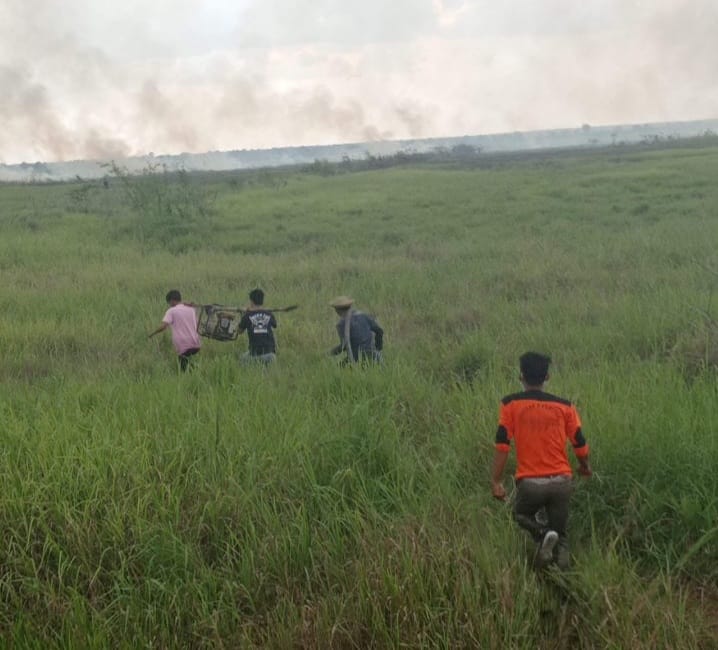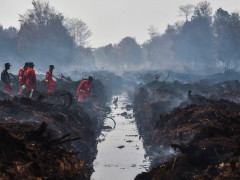A Silver Lining to Restoration in Concession Areas
By ZamzamiWhen the Smoke from Forest and Land Fires Adds to the Complicated Handling of COVID-19 in South Kalimantan

"At that time many people were taken to the hospital. I just wanted to stay on my land," he said, Tuesday, 21 September 2021.
Haiz felt comfortable undergoing his recovery process in the 4x6 meter hut. He didn’t want to get treated together with many other COVID-19 patients when the Delta variant virus (B.1,617.2) was spreading.
From July to September, there was an increase in active COVID-19 cases in all subdistricts in Hulu Sungai Selatan District. The Hulu Sungai Selatan Health Office recorded 138 residents were infected with COVID-19 in three subdistricts, i.e. Daha Selatan, Daha Utara, and Daha Barat from July to September 2021. The figures show a spike compared to the January to June period, which recorded 64 active COVID-19 cases.
Haiz was not the only one who isolated himself in their land. There are also residents of Samuda Village, which is located next to Baruh Jaya Village, who did the same thing when experiencing symptoms of COVID-19. "My brother-in-law went to the forest for self-isolation," said Maslan, a resident of Samuda Village. Abdullah, Maslan's brother-in-law, considered that he made the right choice when isolating himself in the forest. "He can be more comfortable sunbathing there. Now he has regained his health," said Maslan.
Residents who feel comfortable recovering in the forest or on their land still need to pay attention to health threats caused by the smoke from forest and land fires. Although the smoke does not always spread to where they isolate themselves, but when inhaled it will affect their sick body. "When people inhale the smoke, it can decrease their immune system," said the Head of the South Kalimantan Health Office, Muhammad Muslim.
The Expert Team for the Acceleration of COVID-19 Response at Lambung Mangkurat University (ULM) highlighted that forest and land fires can worsen the pandemic situation. "It happened at the same time as the third wave of COVID-19 in South Kalimantan," said Hidayatullah Mutaqqin, a member of the Expert Team.
Hidayatullah explained that South Kalimantan was hit by the third wave of COVID-19 infection from June to September 2021. At that time, the government had relaxed the social restrictions, even though the Delta variant was still rampant. The mobility of the population after the long Eid al-Fitr holiday was also one of the factors that triggered the spread of COVID-19.
Hidayatullah observed that data collection was still lacking during the third wave of COVID-19, as well as for the cases of deaths in rural areas and forest and land fires. Data collection is still limited for testing and tracing. This factor becomes even more complicated when people are reluctant to take the test when experiencing symptoms of COVID-19.
As for the case of Nagara (the old district name for Daha Selatan, Daha Barat, Daha Utara), they have a small population, so the transmission is minimal in that area. However, the virus transmission is also linked to the massive infection cases in urban areas.
"Eventually, COVID-19 will reach remote areas," said Hidayatullah.
Smoke disaster is ever presence
Pantau Gambut observed the billowing smoke in the peat swamp forest at 08.30, Tuesday, 21 September. The smoke was not too thick but the smell reached the residents of Baruh Jaya Village, about 20 kilometers from the fire.
Head of the Indonesian Farmers Union (SPI) for Hulu Sungai Selatan, Bakeri, said that the smoke from the fire appeared in the morning and evening. "The smoke just passes the village," he said.
Most of the burned area is in peat swam that is not cultivated by local farmers. "The farmers' land rarely got burned. The fire is always in the forest around oil palm plantations," said Bakeri.
The analysis of the National Institute of Aeronautics and Space (LAPAN) with a low level of data confidence found that there were 107 hotspots in the Nagara area in the period July to September 2021. 38 hotspots were found in Daha Selatan, 38 hotspots in Daha Utara, and 31 hotspots in Daha Barat.
It is a quite significant difference when compared to the number of hotspots in 2020. LAPAN data shows that 41 hotspots were found from July to September 2020. 15 hotspots were found in Daha Utara, 15 hotspots in Daha Barat, and 11 hotspots in Daha Selatan.
Using the Moderate Resolution Imaging Spectroradiometer (MODIS) Burned Area Product satellite sensor, Pantau Gambut observed that there were 668.08 hectares of burned area in Daha Selatan and 234.25 hectares in Daha Barat when fires hit the area from July to October 2020. No burned areas were found in Daha Utara in 2020.
Bakeri said that the worst fires occurred from August to September 2020. "Smog covered Baruh Jaya Village and its surroundings for a week, every day, all day and night," he said. He added that this year's fires were not so severe due to the intensity of rainfall.
The Chief Executive of the Hulu Sungai Selatan Regional Disaster Management Agency (BPBD), Syamsudin, explained that the locations of hotspots are similar in the 2020 and 2021 fires. "As for the smoke, I think it's worse in 2020. Smoke often spread to the settlements, carried by the wind," he said.
He continued that fires usually occur far from residential areas. "Usually it's in the middle of the forest," he said. Syamsudin added that BPBD Hulu Sungai Selatan did not find any fires in lands with land cultivation permits (HGU) in 2021. "We also don’t want fires to occur outside the HGU areas, we have warned the companies," he said.
If a fire occurs around the HGU area, the company must participate in extinguishing the fire. "We will lead the company's Emergency Preparedness and Response Team (TKTD)," said Syamsudin.
Environmental activists highlight that the government must carry out comprehensive disaster mitigation not only in handling COVID-19, but also in forest and land fires. This is related to the function of the fire prevention infrastructure. "It should be able to function in all villages that are prone to peatland fires," said Campaign Manager for the Indonesian Forum for the Environment (WALHI) South Kalimantan, Muhammad Jefry Raharja.
As for COVID-19, Jefry thinks that the government plays an important role in educating the public, especially in promoting the vaccination program. "We don't know about the upcoming forest and land fires, so we need to make sure that the disaster mitigation measures are really implemented," he said.

.jpeg)
.jpeg)



